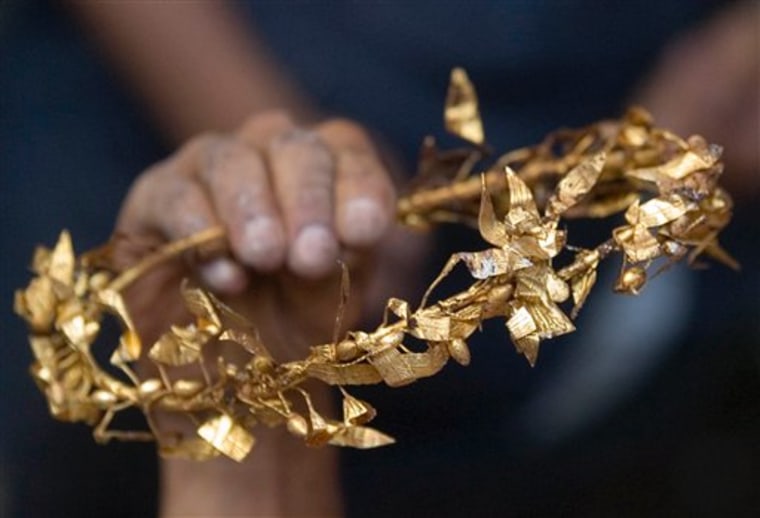Archaeologists have unearthed a 2,400-year old golden treasure in an ancient Thracian tomb in eastern Bulgaria, the director of the country's History Museum said Monday.
The gold-rich burial was discovered late on Saturday by a team of archaeologists, working on excavations near the village of Zlatinitsa, some 180 miles east of the capital, Sofia.
The most impressive finds included a golden ring and wreath, finely crafted silver rhytons, or horn-shaped drinking vessels, and many golden and silver pieces of armor and horse trappings, Prof. Bozhidar Dimitrov told the Associated Press in a telephone interview.
"This was an extremely rich funeral, suggesting that the buried man could have been a Thracian king," Dimitrov said. "Although he was not buried according to Thracian traditions, all objects of art bear Thracian imagery."
The king's body was laid in a huge wood-paneled pit together with two horses and a dog, while Thracian kings were usually buried in vast stone tombs under huge earth mounds.
The Thracians lived in what is now Bulgaria and parts of modern Greece, Romania, Macedonia and Turkey from 4,000 B.C. to the 8th century A.D., when they were assimilated by the invading Slavs. "Greek pottery that was also found in the tomb helped us safely date the whole burial to 360-370 B.C.," Dimitrov said.
According to a hypothesis, the newly discovered tomb could have been that of the Thracian governor Seutus, who declared himself king and used Greek mercenaries to oppress local Thracian tribes. His governance was described by the ancient Greek chronicler Xenophontes, Dimitrov said.
"Excavations continue, and new finds literally pop out every 10 minutes," Dimitrov said.
Thousands of Thracian mounds are spread throughout Bulgaria, and archaeological finds suggest that the Thracians established a powerful kingdom in the 5th century B.C. One of their capitals appeared to be the ancient city of Seutopolis, the ruins of which are now drowned under a large artificial lake near the town of Kazanlak, 120 miles east of Sofia.
Despite numerous archaeological discoveries, little is known about Thracian rulers, because no inscriptions have been found. Thracians had no alphabet and apparently refused to use Greek letters, Dimitrov said.
Last year, another archaeological expedition discovered two vast Thracian tombs in the Kazanlak region, prompting archaeologists to name it "the Valley of Thracian Kings" in reference to the Valley of Kings near Luxor, Egypt, home to the tombs of Egyptian Pharaohs. A 2,400-year-old golden mask was found then, along with many golden artifacts.
